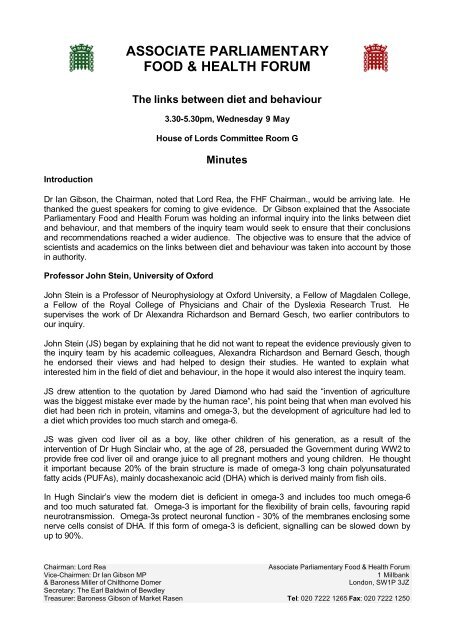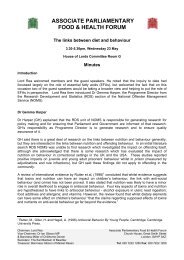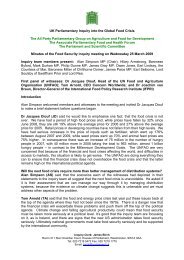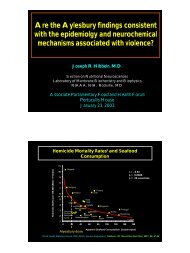Minutes of the meeting - Associate Parliamentary Food and Health ...
Minutes of the meeting - Associate Parliamentary Food and Health ...
Minutes of the meeting - Associate Parliamentary Food and Health ...
Create successful ePaper yourself
Turn your PDF publications into a flip-book with our unique Google optimized e-Paper software.
ASSOCIATE PARLIAMENTARY<br />
FOOD & HEALTH FORUM<br />
The links between diet <strong>and</strong> behaviour<br />
3.30-5.30pm, Wednesday 9 May<br />
House <strong>of</strong> Lords Committee Room G<br />
<strong>Minutes</strong><br />
Introduction<br />
Dr Ian Gibson, <strong>the</strong> Chairman, noted that Lord Rea, <strong>the</strong> FHF Chairman., would be arriving late. He<br />
thanked <strong>the</strong> guest speakers for coming to give evidence. Dr Gibson explained that <strong>the</strong> <strong>Associate</strong><br />
<strong>Parliamentary</strong> <strong>Food</strong> <strong>and</strong> <strong>Health</strong> Forum was holding an informal inquiry into <strong>the</strong> links between diet<br />
<strong>and</strong> behaviour, <strong>and</strong> that members <strong>of</strong> <strong>the</strong> inquiry team would seek to ensure that <strong>the</strong>ir conclusions<br />
<strong>and</strong> recommendations reached a wider audience. The objective was to ensure that <strong>the</strong> advice <strong>of</strong><br />
scientists <strong>and</strong> academics on <strong>the</strong> links between diet <strong>and</strong> behaviour was taken into account by those<br />
in authority.<br />
Pr<strong>of</strong>essor John Stein, University <strong>of</strong> Oxford<br />
John Stein is a Pr<strong>of</strong>essor <strong>of</strong> Neurophysiology at Oxford University, a Fellow <strong>of</strong> Magdalen College,<br />
a Fellow <strong>of</strong> <strong>the</strong> Royal College <strong>of</strong> Physicians <strong>and</strong> Chair <strong>of</strong> <strong>the</strong> Dyslexia Research Trust. He<br />
supervises <strong>the</strong> work <strong>of</strong> Dr Alex<strong>and</strong>ra Richardson <strong>and</strong> Bernard Gesch, two earlier contributors to<br />
our inquiry.<br />
John Stein (JS) began by explaining that he did not want to repeat <strong>the</strong> evidence previously given to<br />
<strong>the</strong> inquiry team by his academic colleagues, Alex<strong>and</strong>ra Richardson <strong>and</strong> Bernard Gesch, though<br />
he endorsed <strong>the</strong>ir views <strong>and</strong> had helped to design <strong>the</strong>ir studies. He wanted to explain what<br />
interested him in <strong>the</strong> field <strong>of</strong> diet <strong>and</strong> behaviour, in <strong>the</strong> hope it would also interest <strong>the</strong> inquiry team.<br />
JS drew attention to <strong>the</strong> quotation by Jared Diamond who had said <strong>the</strong> “invention <strong>of</strong> agriculture<br />
was <strong>the</strong> biggest mistake ever made by <strong>the</strong> human race”, his point being that when man evolved his<br />
diet had been rich in protein, vitamins <strong>and</strong> omega-3, but <strong>the</strong> development <strong>of</strong> agriculture had led to<br />
a diet which provides too much starch <strong>and</strong> omega-6.<br />
JS was given cod liver oil as a boy, like o<strong>the</strong>r children <strong>of</strong> his generation, as a result <strong>of</strong> <strong>the</strong><br />
intervention <strong>of</strong> Dr Hugh Sinclair who, at <strong>the</strong> age <strong>of</strong> 28, persuaded <strong>the</strong> Government during WW2 to<br />
provide free cod liver oil <strong>and</strong> orange juice to all pregnant mo<strong>the</strong>rs <strong>and</strong> young children. He thought<br />
it important because 20% <strong>of</strong> <strong>the</strong> brain structure is made <strong>of</strong> omega-3 long chain polyunsaturated<br />
fatty acids (PUFAs), mainly docashexanoic acid (DHA) which is derived mainly from fish oils.<br />
In Hugh Sinclair’s view <strong>the</strong> modern diet is deficient in omega-3 <strong>and</strong> includes too much omega-6<br />
<strong>and</strong> too much saturated fat. Omega-3 is important for <strong>the</strong> flexibility <strong>of</strong> brain cells, favouring rapid<br />
neurotransmission. Omega-3s protect neuronal function - 30% <strong>of</strong> <strong>the</strong> membranes enclosing some<br />
nerve cells consist <strong>of</strong> DHA. If this form <strong>of</strong> omega-3 is deficient, signalling can be slowed down by<br />
up to 90%.<br />
Chairman: Lord Rea<br />
<strong>Associate</strong> <strong>Parliamentary</strong> <strong>Food</strong> & <strong>Health</strong> Forum<br />
Vice-Chairmen: Dr Ian Gibson MP<br />
1 Millbank<br />
& Baroness Miller <strong>of</strong> Chilthorne Domer<br />
London, SW1P 3JZ<br />
Secretary: The Earl Baldwin <strong>of</strong> Bewdley<br />
Treasurer: Baroness Gibson <strong>of</strong> Market Rasen Tel: 020 7222 1265 Fax: 020 7222 1250
JS’s colleague, David Horrobin, who was also tutored by Hugh Sinclair, helped discover how EPA<br />
is converted into ecosanoids: thromboxanes, prostagl<strong>and</strong>ins (3 series), leucotrienes (5 series) <strong>and</strong><br />
resolvins These are important because <strong>the</strong>y are all anti-inflammatory <strong>and</strong> lead to a reduction in<br />
stress reactions, in contrast to <strong>the</strong> effects <strong>of</strong> omega-6 which are pro- inflammatory.<br />
Fish is fabulous because it speeds up neuronal responses by increasing membrane flexibility, <strong>and</strong><br />
thus improves magnocellular timing functions; increases neurogenesis, neurite outgrowth (via<br />
syntaxin) <strong>and</strong> synapse formation whilst decreasing programmed cell death (apoptosis). As a result<br />
it can improve memory (for example, in patients with Alzheimer’s); streng<strong>the</strong>n hemispheric<br />
lateralisation; protect against inflammation; reduce pain transmission (via inhibiting TRPV1<br />
receptors) <strong>and</strong> prevent <strong>the</strong> accumulation <strong>of</strong> insoluble amyloid precursor protein (which develops in<br />
patients with Alzheimer’s).<br />
Omega-3 essential fatty acids (EFAs) increase <strong>the</strong> production <strong>of</strong> syntaxin, which helps<br />
communications between nerves <strong>and</strong> helps a person consolidate <strong>and</strong> lay down memories. It has<br />
been shown that <strong>the</strong> more fish a person eats <strong>the</strong> less likely he is to get Alzheimer’s disease.<br />
The role <strong>of</strong> omega-3 in improving timing functions <strong>of</strong> magnocellular neurones in <strong>the</strong> brain is <strong>of</strong><br />
particular interest to JS. He described <strong>the</strong> difference between nerve cells which are much larger<br />
than o<strong>the</strong>rs, that is magnocellular, <strong>and</strong> smaller nerve cells (parvocellular). The smaller nerve cells<br />
are important for static responses, for example to colour <strong>and</strong> fine detail whereas <strong>the</strong> magnocellular<br />
type are important for rapid responses, for timing events. They have a high sensitivity to motion<br />
<strong>and</strong> flicker; <strong>the</strong>y control attention <strong>and</strong> eye movements <strong>and</strong> are very vulnerable to omega-3<br />
deficiency.<br />
JS showed a slide (slide 9) which illustrates <strong>the</strong> visual magnocellular system, which directs visual<br />
attention <strong>and</strong> eye movements. It is a system <strong>of</strong> large neurones which are specialised for temporal<br />
processing – tracking changes in light, sound, position etc. Magnocellular neurones allow for<br />
large, rapid signalling <strong>and</strong> fast conduction. They all express <strong>the</strong> same surface antigen, CAT 301.<br />
These magnocelluar neurones are found throughout <strong>the</strong> brain: in <strong>the</strong> visual, auditory, skin, <strong>and</strong><br />
muscle proprioceptors, <strong>the</strong> cerebral cortex, hippocampus (which is important for memory),<br />
cerebellum <strong>and</strong> brainstem (which is important for movement).<br />
The high dynamic sensitivity <strong>of</strong> magnocellular neurones requires high membrane flexibility, which<br />
is provided by a local environment <strong>of</strong> essential fatty acids, particularly <strong>the</strong> omega-3s, found in fish<br />
oils. Thus <strong>the</strong>y are very vulnerable to omega-3 deficiency.<br />
Omega-3 deficiency is important for children’s behaviour because <strong>the</strong> ability to focus attention is<br />
vital for sequencing letters <strong>and</strong> numbers, skilled movements, detecting facial <strong>and</strong> emotional<br />
expressions, such as tone <strong>of</strong> voice <strong>and</strong> gestures. Impaired development <strong>of</strong> magnocellular<br />
neurones is found in many neuro-developmental disorders, such as prematurity, foetal alcohol<br />
syndrome, developmental dyslexia, dyspraxia, dysphasia, ADHD, autistic spectrum disorders <strong>and</strong><br />
Williams syndrome, as well as schizophrenia, depression <strong>and</strong> anti-social behaviour. In all <strong>the</strong>se<br />
conditions <strong>the</strong> child’s ability to focus attention precisely is reduced.<br />
JS noted that <strong>the</strong>se conditions are all slightly different, though <strong>the</strong>y overlap, <strong>and</strong> omega-3 is not <strong>the</strong><br />
only factor that is relevant: genetic <strong>and</strong> environmental factors are also important. However<br />
impaired magnocellular function makes <strong>the</strong>m vulnerable to omega-3 fatty acid deficiency. This<br />
explains why r<strong>and</strong>omised controlled trials (RCTs) using omega-3 supplements have consistently<br />
shown improvement In <strong>the</strong>se developmental disorders, such as dyslexia, dyspraxia, ADHD,<br />
depression, schizophrenia <strong>and</strong> anti-social behaviour.<br />
RCTs are valuable because <strong>the</strong>y eliminate confounding factors, so that <strong>the</strong> only thing that differs<br />
between <strong>the</strong> active <strong>and</strong> <strong>the</strong> control group is <strong>the</strong> treatment, as a result <strong>the</strong>y can prove causation.<br />
However <strong>the</strong> size <strong>of</strong> <strong>the</strong> trial is important. Some academics, for example, Richard Peto, will not<br />
place any reliance on small trials because <strong>the</strong>ir results can be misleading. The largest trials to date<br />
using omega-3 fatty acids - carried out by Bernard Gesch at HM YOI Aylesbury <strong>and</strong> Alex<strong>and</strong>ra<br />
2
Richardson in Durham schools - involved only some 200 individuals in each case. To be<br />
statistically convincing, larger RCTs are required (ideally involving more than 1000 individuals) <strong>and</strong><br />
<strong>the</strong>se should be funded by <strong>the</strong> Government because <strong>of</strong> <strong>the</strong> public benefit that would be derived<br />
from holding <strong>the</strong>m.<br />
JS noted that we cannot rely on <strong>the</strong> suppliers <strong>of</strong> fish oil supplements to finance large RCTs<br />
because fish oil cannot be patented so <strong>the</strong>y would derive no more benefit than <strong>the</strong>ir competitors<br />
from positive results. In any case, large RCTS are very expensive.<br />
John concluded by noting that at present <strong>the</strong>re is no evidence that increased omega-3<br />
consumption would help ordinary normal children – that is those who are not suffering from<br />
developmental disorders – though <strong>the</strong>re is a prima facie case, as during WWII, for it being<br />
beneficial.<br />
Questions<br />
Dr Ian Gibson (IG) asked JS why he thought <strong>the</strong> Government has not already funded such trials.<br />
JS thought <strong>the</strong>re were two primary factors: <strong>the</strong> lack <strong>of</strong> nutritional education in medical schools,<br />
which resulted in nutrition having a relatively low status <strong>and</strong> being regarded as somewhat<br />
“alternative”; <strong>and</strong> a cultural lack <strong>of</strong> interest in food.<br />
Baroness Miller <strong>of</strong> Chilthorne Domer (SM) asked how many trials are needed to prove a case<br />
given that many <strong>of</strong> <strong>the</strong> witnesses who had given evidence to <strong>the</strong> Forum were already convinced.<br />
JS said that in order to convince sceptics, large RCTs were needed so that <strong>the</strong> statistical power <strong>of</strong><br />
<strong>the</strong> results was strong. Only when <strong>the</strong> probability <strong>of</strong> <strong>the</strong> result being due to <strong>the</strong> treatment <strong>and</strong> not<br />
chance is greater than 1 in 1000 will some people, such as Richard Peto, be convinced. The<br />
probability <strong>of</strong> Bernard Gesch’s results (which showed a 26% reduction in <strong>of</strong>fences) being due to<br />
<strong>the</strong> treatment ra<strong>the</strong>r than chance was only 1 in 30.<br />
SM expressed concern about <strong>the</strong> option <strong>of</strong> food fortification on <strong>the</strong> grounds that it would not<br />
encourage people to eat a better diet <strong>and</strong> it would reinforce <strong>the</strong> cereal-based diet rich in omega-6.<br />
JS agreed that it would be preferable for people to eat more oily fish because <strong>the</strong>se fish contain<br />
not only <strong>the</strong> desirable EFAs but <strong>the</strong> vitamins <strong>and</strong> minerals, such as zinc, required to help<br />
metabolise <strong>the</strong>m. However, given that people do not eat oily fish in adequate quantities, he<br />
thought food fortification was better than no action. He noted that no-one objects now to <strong>the</strong><br />
fortification <strong>of</strong> food with iodine <strong>and</strong> folic acid <strong>and</strong> fortification with omega-3 was arguably less<br />
dangerous than, for example, fluoridation because omega-3 would have to be consumed in<br />
enormous quantities to have any negative effect (for example in reducing blood clotting).<br />
Baroness Gibson (AG) asked how much <strong>the</strong> next study JS <strong>and</strong> Bernard Gesch were conducting<br />
in prisons would cost <strong>and</strong> whe<strong>the</strong>r <strong>the</strong> cost had been a factor in delaying Home Office support for<br />
<strong>the</strong> project. JS said <strong>the</strong> cost <strong>of</strong> <strong>the</strong> study would be £1.5 million, an ideal study would cost some £2<br />
million, but <strong>the</strong> Home Office spends vast sums <strong>of</strong> money on o<strong>the</strong>r treatments that have not been<br />
shown to have any effect whatsoever. He thought <strong>the</strong> problem was more institutional <strong>and</strong> <strong>the</strong><br />
result <strong>of</strong> cautious ra<strong>the</strong>r than innovative attitudes on <strong>the</strong> part <strong>of</strong> middle-ranking Civil Servants.<br />
Ano<strong>the</strong>r factor could be Home Office concern that support for <strong>the</strong> project could imply an<br />
acceptance on <strong>the</strong>ir part that <strong>the</strong> prison diet is inadequate, whereas it is <strong>of</strong>ten excellent. The<br />
problem is not that healthy food is not provided in our prisons but that prisoners choose to eat<br />
unhealthy options.<br />
Sarah Jayne Stanes from <strong>the</strong> Academy <strong>of</strong> Culinary Arts noted that most chefs are not trained<br />
in nutrition <strong>and</strong> that as a nation we do not value cooking <strong>and</strong> food enough.<br />
Earl Baldwin <strong>of</strong> Bewdley (EB) asked why JS believed <strong>the</strong> general population might benefit from<br />
increased consumption <strong>of</strong> omega-3 given that <strong>the</strong>re was no evidence that this was <strong>the</strong> case <strong>and</strong><br />
how omega-3 nutritional status should be measured. JS said that he suspected one <strong>of</strong> <strong>the</strong><br />
problems – as Hugh Sinclair found in <strong>the</strong> 1930s – is that <strong>the</strong>re is a great deal <strong>of</strong> concealed<br />
3
nutritional deficiency in <strong>the</strong> general population. Children with no vulnerabilities in terms <strong>of</strong><br />
metabolising EFAs who eat a healthy balanced diet are unlikely to be helped by EFA supplements,<br />
but <strong>the</strong> vast majority <strong>of</strong> children, including especially those living in deprived areas, do not eat a<br />
healthy diet. He referred to Hugh Sinclair who believed children ate a better diet in 1943 than in<br />
1983. JS said he would like to do a nutritional survey in under-privileged communities.<br />
IG asked JS what he thought <strong>the</strong> effect <strong>of</strong> positive trial results for EFAs would be. JS said we<br />
know that <strong>the</strong> IQ <strong>of</strong> children fed on breast-fed milk which is rich in omega-3 is 5-10% higher than<br />
bottle-fed babies, so it is possible that <strong>the</strong> IQ <strong>of</strong> <strong>the</strong> general population would rise if we all<br />
consumed more omega-3 <strong>and</strong> that anti-social behaviour would fall, though probably not by as<br />
much as <strong>the</strong> 26% found at Aylesbury YOI. He also thought people would be happier because<br />
<strong>the</strong>re is a strong link between omega-3 deficiency <strong>and</strong> depression. He said that 25% <strong>of</strong> <strong>the</strong> British<br />
population will be depressed at some point in <strong>the</strong>ir lives <strong>and</strong> omega-3 is known to relieve<br />
depression. He suggested <strong>the</strong>re is a good case for fortifying food with omega-3 for our general<br />
physical health because <strong>of</strong> its positive effect on cardiovascular health.<br />
IG suggested that some doctors think vitamin D is important for cardiovascular health. JS said<br />
<strong>the</strong>re is a <strong>the</strong>ory that statins affect our vitamin D status because <strong>the</strong>y occupy <strong>the</strong> vitamin D<br />
receptor <strong>and</strong> this is linked to depression. Some studies have suggested that omega-3 is as good<br />
as statins in reducing LDL cholesterol.<br />
IG asked whe<strong>the</strong>r JS thought better diet should be achieved by Government diktat or better<br />
underst<strong>and</strong>ing. JS said he would welcome Government intervention on this issue because it would<br />
result in a public good that may not be achieved o<strong>the</strong>rwise.<br />
Pr<strong>of</strong>essor Malcolm Peet, Doncaster <strong>and</strong> South Humber <strong>Health</strong>care NHS Trust<br />
Malcolm Peet is a Consultant Psychiatrist in <strong>the</strong> NHS working with people who are experiencing<br />
<strong>the</strong>ir first episode <strong>of</strong> psychosis. He is a former Head <strong>of</strong> <strong>the</strong> University Department <strong>of</strong> Psychiatry,<br />
Sheffield, <strong>and</strong> he now holds an Honorary Pr<strong>of</strong>essorship from that university. His main interest now<br />
is in <strong>the</strong> practical implementation <strong>of</strong> <strong>the</strong> knowledge he has gained from his research.<br />
Malcolm Peet (MP) very briefly outlined <strong>the</strong> metabolic pathway <strong>of</strong> EFAs (see slide 2), which can be<br />
derived from flax oil or fish oils. He is a vegan <strong>and</strong> obtains his omega-3 from an algae-derived<br />
supplement, which avoids <strong>the</strong> depletion <strong>of</strong> fish stocks <strong>and</strong> any possible chemical contamination.<br />
He noted that companies are now in <strong>the</strong> process <strong>of</strong> seeking to modify foods genetically to produce<br />
EPA <strong>and</strong> DHA.<br />
MP briefly described <strong>the</strong> physiological effect <strong>of</strong> omega-3 fatty acids on <strong>the</strong> brain, including brain<br />
development, gene expression, neurotransmission <strong>and</strong> <strong>the</strong> immune system.<br />
IG intervened to ask why omega-3 ra<strong>the</strong>r than omega-6 or omega-9 was important. JS explained<br />
that omega-3 is so-called because <strong>the</strong> first double bond between carbon atoms is three away from<br />
<strong>the</strong> methyl end (DHA has 22 carbon atoms) <strong>and</strong> this affects <strong>the</strong> way it works. Membranes are<br />
made <strong>of</strong> layers <strong>and</strong> <strong>the</strong> closer <strong>the</strong> double bond is to <strong>the</strong> methyl end <strong>of</strong> <strong>the</strong> chain, <strong>the</strong> more flexible it<br />
is. The o<strong>the</strong>r reason omega-3 is important is that <strong>the</strong> ecosonoids form <strong>the</strong> substrate for signalling<br />
molecules <strong>and</strong> <strong>the</strong>y depend on <strong>the</strong> double bond between <strong>the</strong> third <strong>and</strong> fourth carbon atoms.<br />
The omega-3 long chain polyunsaturated fatty acids can be syn<strong>the</strong>sised slowly from shorter<br />
omega-3s such as alpha linoleic acid (18 Carbon atoms) derived from plant sources (rapeseed,<br />
flax, walnut), but <strong>the</strong> longer chain omega-3 fatty acids: EPA (20 C) <strong>and</strong> DHA (22C) that are<br />
required by <strong>the</strong> brain are obtained much more efficiently from oily fish. However, even <strong>the</strong>se fish do<br />
not syn<strong>the</strong>sise <strong>the</strong>m <strong>the</strong>mselves; <strong>the</strong>y derive <strong>the</strong>m from algae. Some companies are now using<br />
genetically engineered seaweed to produce DHA <strong>and</strong> EPA in quantity.<br />
4
MP’s main interest now is in <strong>the</strong> clinical application <strong>of</strong> this knowledge to patients suffering from<br />
depression or schizophrenia. He said <strong>the</strong>re are very strong grounds for thinking that omega-3 fatty<br />
acids are <strong>of</strong> great importance for depression. He referred to various epidemiological studies,<br />
including Joseph Hibbeln’s (described to <strong>the</strong> inquiry team in March, which demonstrated that<br />
international variations in population rates <strong>of</strong> depression correlate with national fish consumption.<br />
He said that o<strong>the</strong>r studies have clearly shown that individuals who are infrequent fish eaters are<br />
more likely to become depressed <strong>and</strong> that depressed patients have low levels <strong>of</strong> omega-3 fatty<br />
acids in <strong>the</strong>ir cell membranes. MP accepts that one could argue that <strong>the</strong>se correlations do not<br />
establish cause <strong>and</strong> effect, but <strong>the</strong>re is also evidence that omega-3 fatty acids are <strong>of</strong> <strong>the</strong>rapeutic<br />
benefit in depression.<br />
The evidence for <strong>the</strong> effectiveness <strong>of</strong> omega-3 fatty acids in <strong>the</strong> treatment <strong>of</strong> depression comes<br />
from several double blind placebo controlled trials conducted by various independent groups in<br />
different countries. Efficacy is fur<strong>the</strong>r supported by a recent meta-analysis, conducted by a<br />
working group <strong>of</strong> <strong>the</strong> American Psychiatric Association, which included all available placebo<br />
controlled trials to date. 1 The studies generally used omega-3 fatty acids given toge<strong>the</strong>r with<br />
existing anti-depressant treatment <strong>and</strong> found that omega-3 improved <strong>the</strong> response rate. The best<br />
evidence base is for a dose <strong>of</strong> 1 gm daily <strong>of</strong> EPA plus DHA (<strong>the</strong> two main omega-3 fatty acids in<br />
fish oil). MP accepts that meta-analysis is only as good as <strong>the</strong> trials it is based on <strong>and</strong> reflects <strong>the</strong><br />
way trials are selected unless all known studies are included<br />
MP said <strong>the</strong>re is very little research on omega-3 fatty acids as a sole treatment for depression.<br />
The best evidence base is for a dose <strong>of</strong> 1 gm daily <strong>of</strong> EPA plus DHA (<strong>the</strong> two main omega-3 fatty<br />
acids in fish oil). He referred to one small study in children with depression conducted in Israel,<br />
which found that EPA 0.5 to 1 gm daily was effective as a sole treatment in <strong>the</strong>se young people.<br />
He believes this trial needs to be replicated on a larger scale.<br />
MP noted that o<strong>the</strong>r nutrients are also important for depression. The best evidence is for folic acid,<br />
which has been demonstrated to be beneficial in three RCTs. Trytophan was thought to be<br />
effective, but it was taken <strong>of</strong>f <strong>the</strong> market because <strong>the</strong> supplements were contaminated by<br />
chemicals. Some o<strong>the</strong>r nutrients have been investigated, <strong>and</strong> <strong>the</strong>re is some evidence for <strong>the</strong>ir<br />
relevance, <strong>the</strong>y include: zinc, selenium, vitamins B6 <strong>and</strong> B12, iron <strong>and</strong> chromium.<br />
MP said that omega-3 fatty acids had also been found to be significant in <strong>the</strong> treatment <strong>of</strong> o<strong>the</strong>r<br />
conditions, such as recurrent self-harm, borderline personality disorder <strong>and</strong> childhood behavioural<br />
<strong>and</strong> learning difficulties.<br />
MP’s main focus, o<strong>the</strong>r than depression, is <strong>the</strong> treatment <strong>of</strong> schizophrenia. He said <strong>the</strong> incidence<br />
<strong>of</strong> schizophrenia is similar across <strong>the</strong> world, but epidemiology shows that <strong>the</strong> outcome <strong>of</strong> treatment<br />
for schizophrenia is better in developing countries than in more developed countries. This<br />
correlates with national diet: a high saturated fat, high sugar diet is associated with worse longterm<br />
outcomes.<br />
We know that blood levels <strong>of</strong> omega-3 <strong>and</strong> omega-6 fatty acids are reduced in people with<br />
schizophrenia. However, treatment studies using omega-3 fatty acids in schizophrenia have given<br />
mixed results.<br />
MP described a study carried out in Europe, discussed at a conference but not yet published,<br />
which indicated that young people at high risk <strong>of</strong> schizophrenia may have a lower rate <strong>of</strong><br />
developing <strong>the</strong> illness if <strong>the</strong>y are given omega-3 fatty acids. O<strong>the</strong>r trials have shown that people<br />
who have developed <strong>the</strong>ir first episode <strong>of</strong> schizophrenia may need less anti-psychotic medication if<br />
<strong>the</strong>y are also treated with omega-3 fatty acids. However in established schizophrenia treatment<br />
with omega-3 fatty acids has shown no consistent benefit.<br />
1 Freeman MP, Hibbeln JR, Wisner K L, Davis J M, Mischoulon D, Peet M, Keck P E Jr, Marangell L B,<br />
Richardson A J, Lake J. Omega-3 fatty acids: Evidence basis for treatment <strong>and</strong> future research in<br />
psychiatry. Journal <strong>of</strong> Clinical Psychiatry 2006, 67, 1954-67<br />
5
MP referred to a Department <strong>of</strong> <strong>Health</strong> publication, “New Ways <strong>of</strong> Working for Psychiatrists:<br />
enhancing effective person-centred services through new ways <strong>of</strong> working in multi-disciplinary,<br />
multi-agency contexts” (October 2005). This report discusses <strong>the</strong> role <strong>of</strong> dieticians <strong>and</strong> reports:<br />
“Service users need to have access to care, which is appropriate to <strong>the</strong> individual, timely <strong>and</strong><br />
supported. Service users suffer more physical ill health, related to lifestyle <strong>and</strong> have needs, which<br />
have not been met from <strong>the</strong> primary care services.” The report recognises that <strong>the</strong>re are<br />
insufficient specialist dietetic posts within <strong>the</strong> mental health services <strong>and</strong> action needs to be taken<br />
to address this. However, despite this report <strong>and</strong> <strong>the</strong> fact that many patients want nutritional<br />
advice, insufficient progress has been made. The importance <strong>of</strong> good nutrition is better accepted<br />
by patients than medical pr<strong>of</strong>essionals.<br />
MIND did a survey <strong>of</strong> people with mental health problems <strong>and</strong> found that a surprisingly high<br />
number <strong>of</strong> <strong>the</strong>m use dietary strategies such as increasing consumption <strong>of</strong> fruit <strong>and</strong> vegetables <strong>and</strong><br />
decreasing consumption <strong>of</strong> sugar. MP believes that <strong>the</strong> diet which is good for our physical health<br />
is good for our brain <strong>and</strong> it would be strange if that were not <strong>the</strong> case. If people eat a healthy,<br />
balanced diet it will improve <strong>the</strong>ir physical <strong>and</strong> mental well-being. He believes that everyone<br />
suffering from <strong>the</strong>ir first episode <strong>of</strong> psychosis or major depression should have access to proper<br />
dietary advice. His own NHS Trust, <strong>the</strong> Doncaster <strong>and</strong> South Humber <strong>Health</strong>care NHS Trust, is a<br />
forward looking Trust <strong>and</strong> is providing such advice.<br />
They are working to put science into practice by developing a nutrition service for patients. They<br />
provide a nutritional assessment for young people presenting to services with early symptoms <strong>of</strong><br />
psychosis <strong>and</strong> <strong>the</strong>y have established a “Mood <strong>and</strong> Lifestyle Clinic” for people with depression. The<br />
clinic looks at diet <strong>and</strong> o<strong>the</strong>r factors, such as exercise, which is known to be important for tackling<br />
depression. They are developing a simplified <strong>and</strong> structured procedure for dietary analysis <strong>and</strong><br />
advice for use by non-specialists within mental health services, in order to disseminate this<br />
knowledge <strong>and</strong> skill to o<strong>the</strong>r NHS Trusts.<br />
Questions<br />
IG asked MP if he thought <strong>the</strong> human brain is still evolving. MP said that <strong>the</strong>re is recent evidence<br />
that <strong>the</strong> genetic make-up <strong>of</strong> <strong>the</strong> brain changed not that long ago, in evolutionary terms. Omega-3<br />
was important for <strong>the</strong> evolution <strong>of</strong> <strong>the</strong> brain, <strong>and</strong> was made possible by a very high fish intake. It is<br />
thus possible that <strong>the</strong> modern diet if it is maintained for many generations may affect <strong>the</strong> evolution<br />
<strong>of</strong> <strong>the</strong> brain. Meanwhile genes set <strong>the</strong> upper <strong>and</strong> lower limits at which we can function <strong>and</strong> <strong>the</strong><br />
right diet will help us function at <strong>the</strong> optimum level.<br />
AG asked how long <strong>the</strong> Doncaster <strong>and</strong> South Humber <strong>Health</strong>care NHS Trust had been working on<br />
its dietary advice <strong>and</strong> what had been <strong>the</strong> response <strong>of</strong> <strong>the</strong>ir patients. MP said <strong>the</strong>y had been<br />
working on it for some 3 years <strong>and</strong> <strong>the</strong> patients in general are very receptive to a dietary approach.<br />
Given <strong>the</strong> nature <strong>of</strong> <strong>the</strong>ir health problems, many <strong>of</strong> <strong>the</strong>se young people can be difficult to engage<br />
with <strong>and</strong> <strong>the</strong>y have found that discussing diet is <strong>of</strong>ten <strong>the</strong> best way to begin. He said it is difficult to<br />
measure <strong>the</strong> impact <strong>of</strong> <strong>the</strong> dietary treatment because it is only one <strong>of</strong> several concurrent<br />
approaches, but it is enabling <strong>the</strong>m to use lower levels <strong>of</strong> drugs. O<strong>the</strong>r clinicians have noticed<br />
clear improvements in <strong>the</strong> condition <strong>of</strong> patients who have used <strong>the</strong> Mood <strong>and</strong> Lifestyle Clinic.<br />
The Countess <strong>of</strong> Mar (MM) asked if MP was treating in-patients or out-patients. He said most <strong>of</strong><br />
his work now is with out-patients. In <strong>the</strong> past he had looked at <strong>the</strong> diet <strong>of</strong> in-patients <strong>and</strong> had noted<br />
<strong>the</strong>ir very high sugar intake, which was due to large amounts <strong>of</strong> sugar in <strong>the</strong>ir tea <strong>and</strong> <strong>the</strong><br />
consumption <strong>of</strong> sugary drinks from hospital vending machines. He <strong>and</strong> his colleagues had<br />
persuaded <strong>the</strong>ir Unit to remove surgary drinks from <strong>the</strong> vending machine, but he noted <strong>the</strong>y still<br />
remained in many hospitals, which also <strong>of</strong>ten have franchises selling “fast-food”. IG asked if he<br />
was aware <strong>of</strong> similar good practice in o<strong>the</strong>r hospitals/Trusts <strong>and</strong> MP said he was not.<br />
6
EB asked MP if his vegan supplement was as good a supply <strong>of</strong> omega-3 fatty acids as a fish oils<br />
supplement. MP said he thought it was adequate, but at present supplements derived from algae<br />
contain less EPA than fish oils.<br />
IG said he is sitting on <strong>the</strong> Mental <strong>Health</strong> Bill St<strong>and</strong>ing Committee <strong>and</strong> he asked what advice <strong>the</strong><br />
speakers would give him to take to those <strong>meeting</strong>s. MP said he did not want to give <strong>the</strong><br />
impression that <strong>the</strong> correct diet alone is sufficient to solve all mental health problems, but <strong>the</strong>y<br />
know that many <strong>of</strong> <strong>the</strong> young people coming to <strong>the</strong>m with depression or schizophrenia eat very bad<br />
diets <strong>and</strong> <strong>the</strong>y know many <strong>of</strong> <strong>the</strong>m go on to develop diabetes <strong>and</strong> cardiovascular problems, so it<br />
would certainly be worth encouraging <strong>the</strong>m to eat a balanced healthy diet. MP said <strong>the</strong> science in<br />
this area is strong, but doctors are not trained in nutrition <strong>and</strong> <strong>the</strong>re is resistance on <strong>the</strong> part <strong>of</strong> <strong>the</strong><br />
medical pr<strong>of</strong>ession to recognising its importance.<br />
Dr Jennifer Lisle <strong>of</strong> <strong>the</strong> Royal College <strong>of</strong> Physicians Faculty <strong>of</strong> Public <strong>Health</strong> suggested that<br />
patients may be receptive to dietary advice because it enables <strong>the</strong>m to assert some control over<br />
<strong>the</strong>ir treatment <strong>and</strong> MP agreed <strong>and</strong> said that it also enabled <strong>the</strong> families involved to help. She also<br />
suggested that encouraging people to eat more fish for <strong>the</strong>ir physical ra<strong>the</strong>r than mental health<br />
might ensure <strong>the</strong> advice was more readily accepted by <strong>the</strong> public.<br />
Dr Malcolm Garl<strong>and</strong>, Dept. Psychiatry, Royal College <strong>of</strong> Surgeons in Irel<strong>and</strong> (RCSI)<br />
Malcolm Garl<strong>and</strong> is a Consultant Psychiatrist working in Dublin <strong>and</strong> Senior Lecturer at RCSI.<br />
Malcolm Garl<strong>and</strong> (MG) said he entirely agreed with <strong>the</strong> comments <strong>of</strong> John Stein <strong>and</strong> Malcolm Peet<br />
<strong>and</strong> he particularly endorsed <strong>the</strong>ir views on <strong>the</strong> disdainful attitude <strong>of</strong> medical schools to <strong>the</strong><br />
significance <strong>of</strong> diet for <strong>the</strong> treatment <strong>of</strong> illnesses. He said that <strong>the</strong>re was no doubt in his mind that<br />
fish oils are important.<br />
MG expressed regret that <strong>the</strong> pharmaceutical companies have vast resources to undertake large<br />
<strong>and</strong> very expensive trials <strong>of</strong> new drugs, while it is very difficult to undertake research in <strong>the</strong> field <strong>of</strong><br />
nutrition because <strong>of</strong> a lack <strong>of</strong> funding.<br />
His own involvement in research on nutritional factors preceded Joseph Hibbeln’s 1998<br />
epidemiological study, but he had been very influenced by it. This study, which had been published<br />
in <strong>the</strong> Lancet, showed a clear negative correlation between <strong>the</strong> incidence <strong>of</strong> depression <strong>and</strong> fish<br />
consumption.<br />
MG showed a slide (slide 3) which showed how <strong>the</strong> essential fatty acids are derived from dietary<br />
fat <strong>and</strong> which illustrates <strong>the</strong> difference between essential <strong>and</strong> non-essential polyunsaturated fatty<br />
acids (PUFAs). He noted that EPA <strong>and</strong> DHA, <strong>the</strong> two important fatty acids for <strong>the</strong> brain <strong>and</strong><br />
behaviour, can be syn<strong>the</strong>sised but are most easily obtained from fish <strong>and</strong> seafood consumption.<br />
MG noted that omega-3 is important for rheumatological <strong>and</strong> dermatological health as well as<br />
cardiovascular <strong>and</strong> mental health <strong>and</strong> he showed a slide (slide 4) which illustrates <strong>the</strong> early benefit<br />
<strong>of</strong> omega-3 <strong>the</strong>rapy for a range <strong>of</strong> illnesses. Essentially <strong>the</strong> graphs indicate that if you achieve <strong>the</strong><br />
optimum nutritional status (that is, correct any nutritional deficiencies) you feel better.<br />
Rats fed omega-3 have raised levels <strong>of</strong> serotonin in <strong>the</strong> brain (see slide 6). Bar charts from a<br />
study published in Nature in 2006 (slide 7) show that omega-3 promotes brain growth as well as<br />
<strong>the</strong> flexibility <strong>of</strong> brain cells. This has important implications for brain healing after injury.<br />
Slide 8 shows that animals supplemented with omega-3 have a lower level <strong>of</strong> plaque formation,<br />
thus lowering <strong>the</strong> progression <strong>of</strong> Alzheimer’s <strong>and</strong> <strong>the</strong>re is evidence for a similar effect in humans.<br />
MG said that man’s ancient diet, before <strong>the</strong> agricultural revolution, had a balance <strong>of</strong> 1:1 in terms <strong>of</strong><br />
omega-3 to omega-6, whereas <strong>the</strong> ratio is now some 1:20. So as well as increasing consumption<br />
7
<strong>of</strong> omega-3, we might also think in terms <strong>of</strong> reducing omega-6 consumption, but <strong>the</strong>re had been<br />
surprisingly little discussion <strong>of</strong> this issue in <strong>the</strong> literature.<br />
Increased dietary omega-6 is not simply derived from increased cereal <strong>and</strong> vegetable oil<br />
consumption but, because it is available through o<strong>the</strong>r foods depending on what <strong>the</strong>y are fed, <strong>the</strong>re<br />
is <strong>the</strong> additional knock on effect <strong>of</strong> increasing our omega-6 levels by consuming farmed animals<br />
<strong>and</strong> animal products. Thus eggs from battery chickens will have relatively low levels <strong>of</strong> omega-3<br />
compared with supermarket eggs (see slide 11). Farmed animals such as salmon have less<br />
omega-3 than <strong>the</strong> wild variety.<br />
Stoll et al showed in 1999 that omega-3 helps achieve remission in bipolar disorder (see slide 12).<br />
Nemets el al demonstrated in 2002 that patients with depression benefited from omega-3<br />
supplementation (see slide 13). MG also suggested <strong>the</strong>re was some evidence that “healthy”<br />
people function better, feel less fatigued <strong>and</strong> have reduced levels <strong>of</strong> anger, anxiety, confusion <strong>and</strong><br />
depression when taking omega-3 supplements (see slide 14, illustrating <strong>the</strong> findings <strong>of</strong> Fontani et<br />
al in 2005).<br />
MG’s own research, conducted with Joseph Hibbeln <strong>and</strong> o<strong>the</strong>rs, had looked at <strong>the</strong> effect <strong>of</strong> omega-<br />
3 supplementation on “noisy” patients – those patients presenting with a number <strong>of</strong> problems<br />
including self-harm, impulsivity <strong>and</strong> family problems – because <strong>the</strong>y wanted to investigate its<br />
impact on a range <strong>of</strong> measures. This was in keeping with <strong>the</strong>ir view that if modern populations are<br />
deficient in omega-3s <strong>the</strong>n supplementation should improve all <strong>and</strong> not just some aspects <strong>of</strong><br />
mental function.<br />
IG intervened to ask if <strong>the</strong> guest speakers believe omega-3 would help most people with mental<br />
health problems. JS said he believes this is true, but he would recommend that proper studies are<br />
carried out as/when patients are given omega-3 supplements so that <strong>the</strong> effect on <strong>the</strong>m could be<br />
measured. MG suggested scientific evidence should lead any debate on policy, but JS pointed out<br />
that public policy is <strong>of</strong>ten made without any scientific evidence to show it will be effective. MG said<br />
it is important to note that <strong>the</strong>re are sound RCTs as well as epidemiological studies to demonstrate<br />
<strong>the</strong> beneficial effect <strong>of</strong> omega-3 on a range <strong>of</strong> illnesses.<br />
MG said that he <strong>and</strong> his colleagues had measured <strong>the</strong> nutritional status <strong>of</strong> <strong>the</strong>ir patients <strong>and</strong> found<br />
that total levels <strong>of</strong> omega-3 <strong>and</strong> omega-6 were significantly lower in <strong>the</strong> self-harm group than <strong>the</strong><br />
control group after adjusting for confounding factors, such as fish consumption (see slide 16).<br />
Moreover <strong>the</strong> lower levels <strong>of</strong> omega-3 (but not omega-6) correlated closely with increased levels <strong>of</strong><br />
impulsivity <strong>and</strong> depression. The findings <strong>of</strong> different omega-3 levels in populations eating roughly<br />
equal amounts <strong>of</strong> fish could be accounted for by for genetic or metabolic reasons <strong>and</strong> requires<br />
fur<strong>the</strong>r study.<br />
The patients in <strong>the</strong> next, <strong>and</strong> principal, study 2 were split between 25 in a control group (receiving<br />
placebo) <strong>and</strong> 25 in <strong>the</strong> group receiving supplements. Although this was a small study, <strong>and</strong> a larger<br />
RCT is needed, <strong>the</strong>y believe <strong>the</strong>ir results are valuable. The depression scores improved for<br />
patients taking <strong>the</strong> supplements <strong>and</strong> <strong>the</strong> scores were still diverging from <strong>the</strong> control group when <strong>the</strong><br />
study ended (at 12 weeks), suggesting that <strong>the</strong>y might continue to improve with a longer period <strong>of</strong><br />
supplementation (see slide 18). MG emphasised that a change in a BDI score <strong>of</strong> 16-17 points is a<br />
big change <strong>and</strong> would be very noticeable clinically. The perceived stress scores, which measure<br />
responses to everyday factors, also continued to diverge throughout <strong>the</strong> study period with patients<br />
taking <strong>the</strong> supplements showing a clear benefit (see slide 19). The “Daily Hassles <strong>and</strong> Uplift”<br />
score (slide 20) again shows benefit for those taking <strong>the</strong> active treatment. These scores are<br />
independent <strong>of</strong> <strong>the</strong> scores for depression <strong>and</strong> indicate several different mechanisms <strong>of</strong> omega-3<br />
action. However <strong>the</strong> measures for impulsivity did not change, which was against expectation.<br />
2 Malcolm R. Garl<strong>and</strong>, Brian Hallahan, Mairead McNamara, Philip A. Carney, Helen Grimes, Joseph R.<br />
Hibbeln, Andrew Harkin <strong>and</strong> Ronan M. Conroy: Lipids <strong>and</strong> essential fatty acids in patients presenting with<br />
self-harm. British Journal <strong>of</strong> Psychiatry (2007) 190 112-117.<br />
8
MG expressed regret that <strong>the</strong>y did not have enough patients <strong>and</strong> <strong>the</strong> trial had not gone on long<br />
enough to see whe<strong>the</strong>r <strong>the</strong>re was any significant change in <strong>the</strong> incidence <strong>of</strong> self-harm between <strong>the</strong><br />
two groups. He would like to undertake a larger study to see whe<strong>the</strong>r omega-3 supplementation<br />
does reduce patients repeating non-lethal self-harm.<br />
The cost <strong>of</strong> this study had been 70-80,000 euros, which he argued was much less than would be<br />
required to produce similarly statistically valid results for pharmaceutical drugs.<br />
MG’s conclusion is that to reach optimum omega-3 status we need to increase fish-consumption<br />
four-fold to two portions <strong>of</strong> oily fish a week <strong>and</strong> this is not without problems, for example possible<br />
mercury contamination could undo <strong>the</strong> benefit <strong>of</strong> additional omega-3. He noted with interest that<br />
companies such as Monsanto are attempting to modify foods to increase <strong>the</strong>ir omega-3 content.<br />
Questions<br />
Lord Rea (NR) welcomed JS’s physiological explanation for <strong>the</strong> significance <strong>of</strong> omega-3, but<br />
queried his view that fish oil supplement companies had no interest in funding RCTs. JS reiterated<br />
his view that individual companies were unlikely to provide <strong>the</strong> £2-3 million required for large RCTs<br />
because <strong>the</strong>y would gain no benefit relative to <strong>the</strong>ir competitors from such research. He believes<br />
<strong>the</strong> Government should commission <strong>the</strong> research for <strong>the</strong> public good.<br />
NR also asked for confirmation that algae-derived supplements would be a good source <strong>of</strong> omega-<br />
3 <strong>and</strong> JS agreed <strong>the</strong>y are a good source.<br />
MM said that consumption <strong>of</strong> cod liver oil had helped reduce <strong>the</strong> pain <strong>of</strong> arthritis as well as<br />
depression suffered by a member <strong>of</strong> her family.<br />
Pr<strong>of</strong>essor Jack Winkler asked MG what evidence he had for his view that food was being fortified<br />
with alpha linolenic acid. MG said he believed you can taste <strong>the</strong> difference when fish oil is used to<br />
fortify food, but he emphasised he is not a dietician. JW noted that <strong>the</strong>re had been a large<br />
increase in <strong>the</strong> number <strong>of</strong> foods being fortified with omega-3 <strong>and</strong> we need to know what EFA<br />
sources are being used by <strong>the</strong> companies concerned. MG emphasised that some <strong>of</strong> <strong>the</strong> oily fish<br />
that were good sources <strong>of</strong> omega-3 were widely available, such as pilchards <strong>and</strong> mackerel.<br />
Conclusion<br />
Lord Rea thanked <strong>the</strong> speakers for <strong>the</strong>ir presentations <strong>and</strong> <strong>the</strong> <strong>meeting</strong> ended.<br />
CLC, May 2007<br />
9












